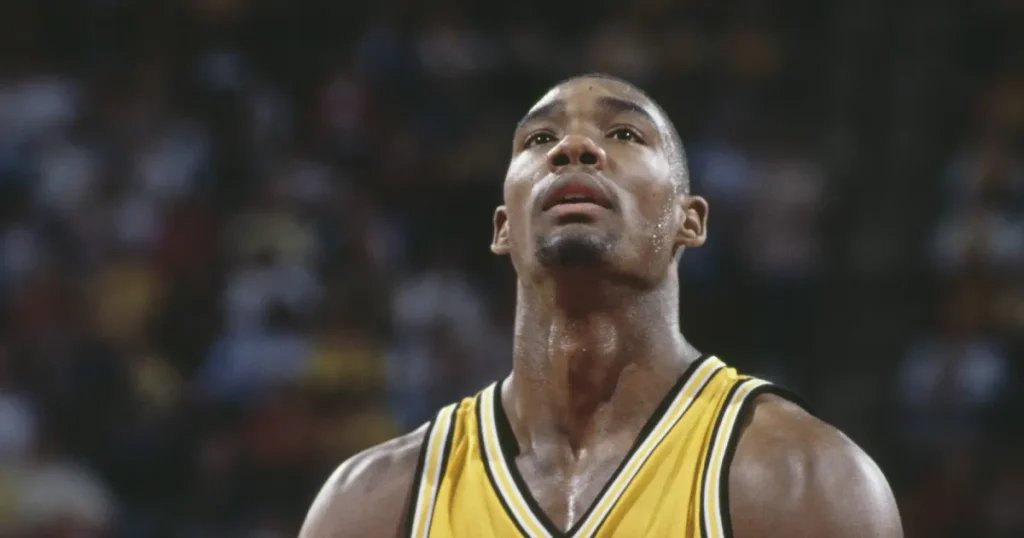Remembering Rodney Rogers: NBA Star and Beacon of Resilience
Former NBA standout Rodney Rogers passed away on November 21, 2025, at the age of 54 from natural causes connected to a spinal cord injury he suffered in 2008. Rogers, who played 12 seasons in the NBA and won the prestigious Sixth Man of the Year Award in 2000, died peacefully surrounded by his wife, Faye. He leaves behind a powerful legacy not only as a basketball player but as a symbol of courage and perseverance in the face of extraordinary challenges. His family announced his passing through a statement released by Wake Forest University, his college alma mater, noting that “he made his transition peacefully, surrounded by the endless love of his devoted wife.” Rogers is survived by his wife and three children: daughters Roddreka (an assistant coach for Georgia State women’s basketball) and Rydeiah (who played basketball at North Carolina State from 2015 to 2019), as well as his son Rodney Rogers II.
Rogers’ life changed dramatically in November 2008 when he was involved in an ATV accident near Raleigh, North Carolina. The crash occurred when he accidentally drove into a ditch and was thrown over the handlebars, leaving him paralyzed from the shoulders down. Despite this life-altering injury, Rogers refused to surrender to despair. Instead, he faced his new reality with remarkable courage and determination, becoming an inspiration to countless people. Former Wake Forest coach Dave Odom captured the essence of Rogers’ character when he said, “Every time we visited him, I walked away reminding myself never to complain—because he never did.” Odom further reflected that Rogers “faced life exactly as it came and made the very best of every moment,” embodying a spirit of resilience that transcended his athletic achievements and spoke to his remarkable character as a human being.
Before his NBA career, Rogers established himself as a transformative college basketball player at Wake Forest University, which he joined in 1990. His impact on the program was immediate and profound, culminating in his selection as the Atlantic Coast Conference Player of the Year and a First-Team All-American in his final season. John Currie, Wake Forest’s former athletic director, described Rogers’ contribution to the university in glowing terms: “Rodney Rogers transformed and accelerated the upward trajectory of Wake Forest University as well as Demon Deacons basketball from the moment he signed his letter of intent in the fall of 1989.” Currie emphasized that Rogers’ “generational combination of power and grace as a player was exceeded only by the size of his heart,” adding that his perseverance following his accident “inspired thousands and embodied the true meaning of Pro Humanitate,” the university’s motto which translates to “For Humanity.” Rogers became a living example of this principle, showing extraordinary strength in every chapter of his life.
Rogers’ professional basketball career began when he was selected as the ninth overall pick by the Denver Nuggets in the 1993 NBA Draft. His 12-year NBA journey would take him through several teams, including a notable four-year stint with the Los Angeles Clippers. However, it was during his time with the Phoenix Suns that Rogers reached the pinnacle of his professional success, earning the NBA’s Sixth Man of the Year Award in 2000—a testament to his valuable contributions coming off the bench. His versatility, power, and skill made him a valuable asset to every team he played for, including later stops with the New Jersey Nets, New Orleans Hornets, and finally the Philadelphia 76ers before he retired from professional basketball in 2005. Throughout his career, Rogers was known not only for his athletic abilities but also for being a supportive and beloved teammate.
In recognition of his passing, the NBA released a heartfelt statement acknowledging Rogers’ contributions both on and off the court. “The NBA family is deeply saddened by the passing of Rodney Rogers,” the statement read. “Rodney earned the Sixth Man of the Year Award while playing for the Phoenix Suns and was a beloved teammate during his 12-year NBA career. He will be remembered not only for his achievements on the court but also for the extraordinary resilience, courage and generosity that he demonstrated throughout his life—qualities that inspired so many.” This tribute highlights how Rogers’ influence extended far beyond his statistical contributions to the game, touching the lives of teammates, fans, and the broader community through his character and determination to make the best of difficult circumstances.
Perhaps the most powerful testament to Rogers’ character comes from those who knew him best. Former coach Dave Odom described him as an “extraordinary talent” who was “every bit as remarkable as a human being.” Odom emphasized that Rogers “loved his teammates, he loved his family, he loved Wake Forest and he loved the game of basketball,” painting a picture of a man whose passion and affection extended to all aspects of his life. The fact that Rogers never complained about his condition despite its severity speaks volumes about his character and perspective on life. In the years following his injury, Rogers became a different kind of role model—one who demonstrated how to face adversity with dignity, grace, and an unwavering positive spirit. His legacy will continue through his family, through the Wake Forest community, and through all those inspired by his remarkable journey from basketball star to beacon of human resilience.


